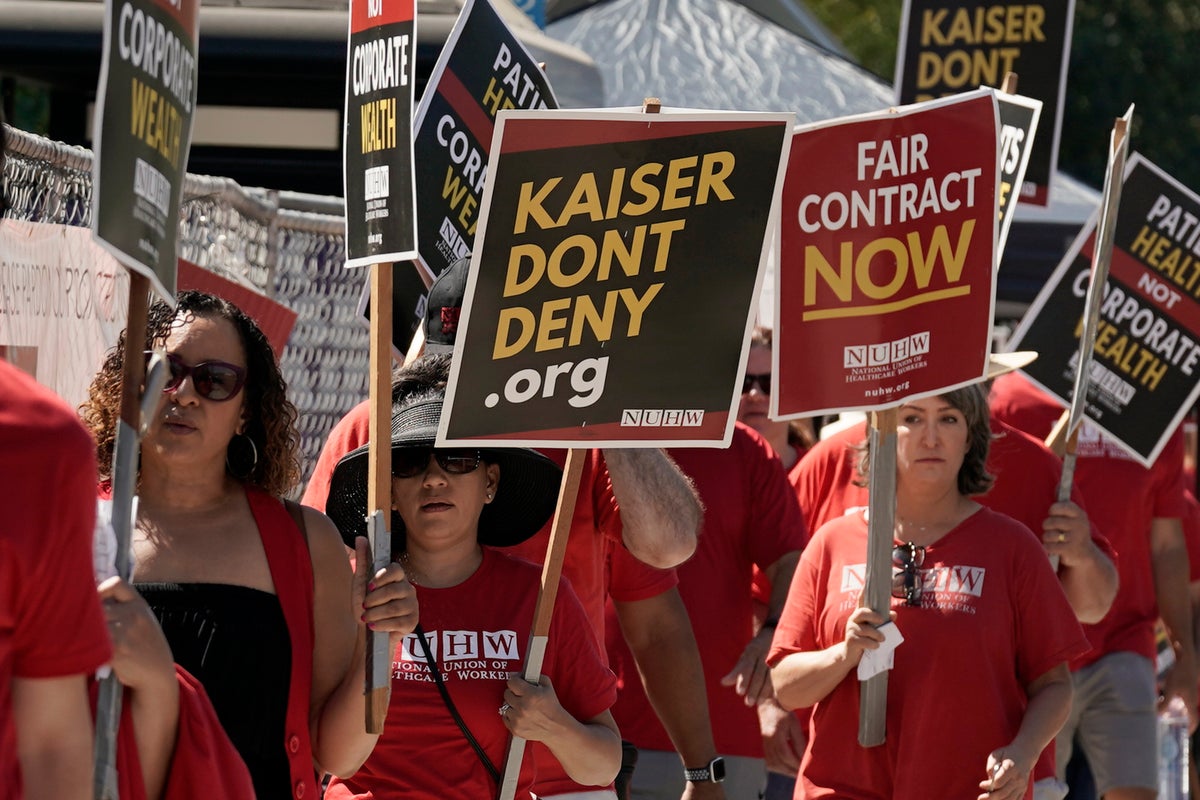
The largest healthcare strike in US history went into effect on Wednesday as negotiations between Kaiser Permanente and the coalition of workers have not agreed to a contract.
As a result, 75,000 nurses, therapists, technicians, sonographers, and other hospital staff went on strike after their contract expired on 30 September.
Both sides are telling very different stories, and as of Tuesday as both sides have yet to reach a new agreement.
Here’s what to know about the workers’ strike against the largest private nonprofit healthcare organisation in the country.
Where and when is the strike happening?
The strike began at 6am PT on Wednesday, with workers striking in California, Oregon, Washington, Colorado, Virginia and Washington DC.
Both sides predicted a three-day strike, from 4 October to 7 October.
What are the healthcare workers seeking?
One major point of conflict is staffing. In a 5 September letter, the Coalition of Kaiser Permanente Union urged the hospital system to view the staffing shortage as “the patient emergency that it is.”
The letter said that Kaiser Permanente is facing “record attrition” and 30,000 vacancies. This shortage is leading to increased patient wait times and an exacerbated strain on healthcare workers, which only “accelerates the exodus from the field,” the coalition wrote.
On 30 September — the date of the contract expiration — the Coalition of Kaiser Permanente Unions explained that the strike was over “unfair labour practices” and argued that the hospital system is engaging in “bad faith” bargaining.
The coalition wrote a list of demands, outlining that they are looking for across-the-board wage increases, protections against outsourcing, the right to unionise a system that Kaiser acquires, and better benefits.
In August, unions representing Kaiser workers asked for a $25 hourly minimum wage, with pay increases over time.
On Tuesday evening, Caroline Lucas, Executive Director of the Coalition of Kaiser Permanente Unions, said that “no agreement can be made until Kaiser executives stop bargaining in bad faith and committing unfair labor practices.” She added, “Patients and workers need dramatic action now to solve the Kaiser short-staffing crisis and to ensure our patients’ safety.”
What is Kaiser saying?
In terms of the ongoing negotiations, Kaiser said in an early morning Wednesday statement: “Both Kaiser Permanente management and Coalition union representatives are still at the bargaining table, having worked through the night in an effort to reach an agreement. There has been a lot of progress, with agreements reached on several specific proposals late Tuesday.”
The hospital system also specifically addressed the hiring shortage on Monday. Kaiser said, “Despite the acute shortage of healthcare workers nationally, we have been able to hire more than 50,000 frontline employees in the last two years: 29,000 people in 2022, and another 22,000 so far this year.”
In April, Kaiser and the coalition agreed to a goal of hiring 10,000 new people for jobs represented by the coalition by the end of the year; Kaiser said it expects to reach that goal by the end of October.
Addressing the wage increases, the hospital system said that its current offer includes across-the-board wage increases from 12.5 to 16 per cent over four years. The proposed minimum wage would start at $21 in Washington, Oregon, Colorado, and DC and $23 in California, with an increase over the next four years of the contract.
How does the strike affect patients?
Kaiser serves nearly 13 million patients, who will remain a “top priority” as the strike goes into effect, the statement said.
Kaiser hospitals will remain open even in the event of a strike. The hospital system explained, “Our facilities will continue to be staffed by our physicians, trained and experienced managers, and staff, and in some cases we will augment with contingent workers.”
However, some fear that the strike could lead to disruptions in vaccine administration. “The bigger issue is how long the strike will be. If it goes beyond three days, then I think we are looking at more disruptions and more difficulties for people to get the COVID-19 vaccine and other care services they need,” Janet Coffman, professor at the Healthforce Center at UCSF, told KQED.
In an effort to try to quash those concerns, Kaiser told the outlet: “Since the FDA authorized the updated COVID-19 vaccine, large-scale distribution has been a challenge for vaccine providers nationwide, including Kaiser Permanente. However, we have now received our supply and expect a consistent supply of the vaccine going forward.”
Have similar strikes happened before?
Burnout in the healthcare field has increased since the Covid-19 pandemic overwhelmed workers and overran facilities.
Last year, 15,000 members of the Minnesota Nurses Association went on strike for three days in the state over staffing shortages, pay, and safety concerns. Earlier this year, in another part of the country, roughly 7,000 members of the New York State Nurses Association went on strike over pay and staffing complaints.
What are other healthcare unions saying?
Catherine Kennedy, a resident nurse and a president of California Nurses Association/National Nurses Organizing Committee, weighed in on the current strike in a statement.
“Registered nurses and members of CNA/NNOC at Kaiser Permanente stand in solidarity with the striking workers, who are demanding the health care giant invest its profits back into patient care. RNs know the devastating impacts of Kaiser’s manufactured staffing crisis on patient care, including delays in care and lack of access,” she said.
Ms Kennedy also pointed out that this year alone, “Kaiser has made more than $3bn in profits, and yet hospitals and clinics remain short-staffed. Rather than invest in direct, hands-on patient care, Kaiser is spending millions of dollars on outsourcing schemes that remove patients from the hospital. Executives are also diverting profits from patient care to acquire health systems in other states.”
She concluded: “CNA/NNOC Kaiser nurses are supporting their colleagues this week by holding actions inside and outside their hospitals. We call on Kaiser to settle a fair contract that respects workers and patients.”







